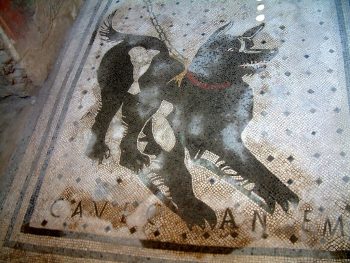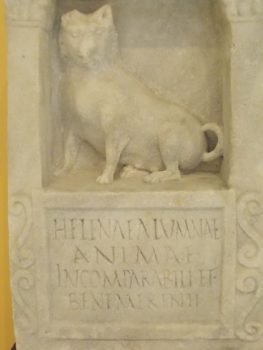Saying Goodbye to Man’s Best Friend Posted by Brittany Britanniae on Aug 31, 2020 in Latin Language, Roman culture
Salvete Omnes,
There comes a time in every dog owner’s life when their beloved friend and family member is ready for the rainbow journey (as I have heard it called). This connection to our beloved doggie pets is not a new or modern attachment but one that has traces throughout history and of course the Roman are no exceptions. I have chosen this topic as my own beloved pet, Emi, now twelve years old has decided that her time with me is nearly over and she is ready for her next adventure. So this blog post is rather cathartic in nature – but in thinking how to commemorate my love, feelings, and history with her – I look back on my foundation (education foundation) to what did the Romans do – how did they say those feelings love and loss – would I transcribe my own Grave Stele in Latin for her? If I could find the words, I think I would. If this is too tender a subject for you, I recommend my post on famous weird Roman pets or popular pets.
I was first introduced to the notion of animal grave steles during my Classical education at the University of
California Riverside, but I must credit the Getty Villa in Santa Monica, California for providing additional insight and primary sources including the gravestone of Helena. There is some speculation on whether this is a little girl’s grave and the dog is a protective symbol OR if it a dog’s grave. In this case, let us say it is that of a dog.
Helenae alumnae
animae
incomparabili et
bene merenti.“To Helena, foster daughter,
the soul
incomparable and
well-deserving (worthy).”
However, the passage I truly wish to focus on is for the “Tombstone with a poem for a dog called Patrice;” I would wish to spend more time on this translation, but for the sake of the learners – I will translate each line literally in the order of the words to assist beginner learners and then poetically or in better English. I highly recommend for those still working on forms and tense to use this resource.
Portavi lacrimis madidus te nostra catella,
quod feci lustris laetior ante tribus.
ergo mihi, Patrice, iam non dabis osculla mille
nec poteris collo grata cubare meo.
tristis marmorea posui te sede merentem
et iunxi semper manib(us) ipse meis,
morib(us) argutis hominem simulare paratam;
perdidimus quales, hei mihi, delicias.
tu dulcis, Patrice, nostras attingere mensas
consueras, gremio poscere blanda cibos,
lambere tu calicem lingua rapiente solebas
quem tibi saepe meae sustinuere manus,
accipere et lassum cauda gaudente frequenter
– – – – – –
I carried with tears, I being soak or wet, you, our pup/small dog (female)
Soaked with tears, I carried you, our little dog
Which I did, in fives years, I being happier, before with threes (three and five are ablatives of time)
Which I did, being happier, before fifteen years ago.
Therefore, to me, Patrice, now not will you give 1,000 kisses
Therefore now, Patricus, you will no (longer) give me 1,000 kisses
Nor, will you be able neck being affectionate lie mine.
Nor will you able to lie lovingly at my neck.
With sadness, in marble, I placed you, dwelling, worthy one
With sadness, I placed you, a good girl, in a marble tomb.
and I have fastened/united always (you implied from te above) to spirit self me.
and I have fastened/attached you always to my very/own spirt.
With a showing habit (Ablative Absolute), to humans similar you were scheming/clever
With an assertive demonstration, you were clever, similar to a human
Having lost of what kind, woe is me! a darling
Of what kind of darling(pet) I have lost! Woe is me!
You sweet, Patrice, our you would join table.
You sweet (boy), Patricus, you used to join our table
You had been devising lap to beg with fawning food
Fawning, you had been devising to beg for food from our laps
To lick, you cup with tongue seizing you were accustomed to
You used to lick the cup with your seizing tongue
which to you often my held hands
which often my hands held to/for you
to accept and weary with tail delighted frequently
and frequently to welcome (your) weary (owner) with a delighted (wagging?) tail.
Oh, what sweet words.

Build vocabulary, practice pronunciation, and more with Transparent Language Online. Available anytime, anywhere, on any device.






Comments:
Larry Creech:
Such a lovely thought; and I can feel how heartfelt it is. I am sorry for your loss, but so happy you had the time with her that you did. The memories will eventually replace the grief you feel.
Lili Palatinus:
Great article, I loved it! I would like to ask you about the dog Patrice. I think the form ‘Patrice’ is a latin vocativus, like filius in vocaus form filii, so the dog’s name is Patricus, or am I wrong?
Brittany Britanniae:
@Lili Palatinus You are correct it should be Patricus due to the vocative form. Great catch!